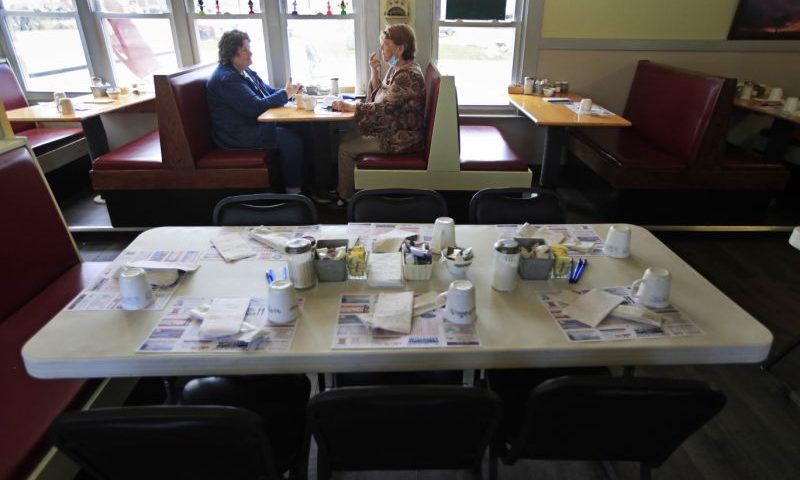Fast food restaurants have fared better than sit-down restaurants as the coronavirus pandemic gripped the U.S. But that gap could start to close as dining rooms reopen.
Fast food restaurants — well equipped for drive-thru and takeout service — have fared better than sit-down restaurants as the coronavirus pandemic gripped the U.S., but that gap could start to close as dining rooms reopen.
U.S. customer transactions at full-service restaurant chains like Olive Garden and Applebee’s plummeted 79% year-over-year at the beginning of April as lockdowns closed dining rooms across the country, according to NPD Group. Fast food sales were down as well, but by 41%.
A month later, those numbers are improving. For the week ending May 10, full-service restaurant transactions were down 58%, while fast food sales were down 21%. States with the most dining rooms open, like Texas and Tennessee, had some of the highest sales.
Major chains represent 76% of U.S. restaurant industry traffic, NPD said. Independent restaurants saw steeper sales declines than chains as lockdowns began, and data on their recovery lags the data available for chains. But many independent restaurants are also opening their dining rooms again.
“America is hungry to dine out again. They’re naturally curious and cautious, but they’re coming out,” Applebee’s President John Cywinski said.
Applebee’s has opened around 200 of its 1,660 dining rooms in the U.S. Guests are tipping generously and drinking a lot of alcohol, Cynwinski said. They’re also respectful of Applebee’s precautions, like the use of disposable silverware and menus.
As of this week, 32 states — mostly in the Midwest and South — have allowed dining rooms to open at least partially, according to Brian Vaccaro, an analyst with Raymond James.
That’s helping sit-down restaurants. Olive Garden had 179 dining rooms open the week of May 3. By the week of May 17, that had jumped to 398, or 49% of the chain’s total. Sales per restaurant increased 13% during that time.
Some fast food restaurants — which already relied more heavily on drive-thru and takeout — have been slow to reopen dining rooms. McDonald’s, which has 14,000 U.S. locations, has only opened around 125 dining rooms so far. The company distributed a 59-page rule book that franchisees must follow as they reopen dining rooms. Play spaces must be closed, for example, and masks must be available for customers if they request them.
Restaurant Brands International, which owns Burger King, Popeyes and Tim Hortons, has opened around 1,500 dining rooms, or 15% of its U.S. total. Seats are spaced further than they used to be, and plastic dividers separate customers from cashiers.
Restaurant Brands CEO Jose Cil says opening dining rooms helps customers feel more confident as they slowly re-establish their routines.
“It gives them comfort that they can step out of their home and enjoy it at one of our restaurants,” Cil said this week as he sat in a Burger King dining room in Miami. Masked employees frequently sanitized tables nearby.
NPD analyst David Portalatin says full-service restaurants have more issues than fast food restaurants when it comes to reopening dining rooms. It costs more to hire back waitstaff, and they may decide it’s not worth reopening if they can only allow in a limited number of guests. Some may also need to reconfigure parking lots that are now set up for curbside service.
Applebee’s says it will keep takeout in place, since demand has tripled since the start of the year and introduced new customers to the brand.
But Cynwinski said dining rooms will also continue to reopen. The chain hopes 80% of its dining rooms will be open by the end of June.
“There’s so much pent-up demand. It’s a little indulgence now to hop in your car and experience something that hasn’t been available,” he said.

